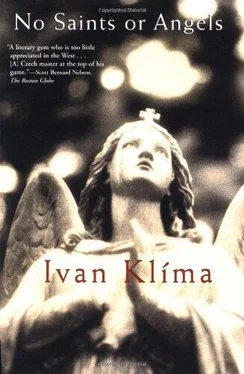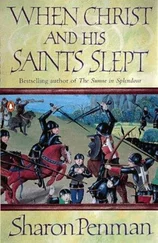It's four in the morning and it's still dark outside. My nightdress is soaked in sweat and my throat is dry.
I get up and go barefoot into the kitchen. The fridge is humming as I enter; it also judders; I ought to put a wedge under one side. There are lots of things I ought to do — things to repair and see to, but at this moment I just take out a bottle of wine and mix myself a spritzer.
When, at last, will my husband stop deserting me and disappearing just as I'm suspended above a chasm?
I go back to bed and try to think of something positive. Once when I was depressed I asked my husband what was the point of human life.
He looked at me in amazement, as if my question was evidence of my inferiority, but then he consented to reply. Fundamentally speaking we don't actually have any life, because the duration of our lives is so brief in comparison with cosmic time that in fact it
is unrecordable. And what can't be recorded virtually does not exist.
An interesting answer to my question. We live as if we actually didn't exist. If God did create this Universe, he knows nothing about us, only we think we know about him. We are too small to be measured and so we can do harm. We can also kill — which we do a lot, or at least men all over the world do.
But people want to leave something behind them. When my dad was young I'm sure he believed he was helping to plant a new Garden of Eden, though he forgot that the soil that life grows from is love. But his head gardener preached hatred and so instead of creating a garden Dad helped pave an execution yard. He never admitted it, but towards the end he must have had an inkling of how woefully wrong he had been. And he didn't build a house or even plant a tree that would yield something; he didn't have the time and it wasn't in his nature. But from time to time he would bring home some useless objects; I don't know where he came by them, most likely during confiscations he took part in. He brought home a box of angling flies even though he never went fishing. He brought books in languages he didn't understand and gave Mum a box stuffed with reels of grey thread. The thread was still there when he died. There is so much of it that if we tied all the lengths end to end I expect they'd stretch round the Equator.
What will I leave behind? Plenty of bridges, fillings and dentures, of course. And in fact, ever since I've been able to order any materials I please, they've been top-quality bridges, fillings and dentures. Also a daughter that I've not been very good at bringing up. But what can possibly remain after the tenth or even the hundredth blink of God's eye, when all the words are forgotten and there's no one left to remember what I looked like? Who then will look at the crumbling photos, if any remain somewhere?
Maybe deeds of love leave some trace behind — or at least their repercussions do. Maybe someone, some higher justice, is counting by how many drops one manages to lower the level of
pain in the world. That's one thing I've managed — in people's mouths, at least. Pain in the soul I can't do anything about, not even my own.
The darkness outside is disappearing. I glance out of the window. The streets are still empty; the metal bodies of the cars are damp. A lonely drunk staggers along the opposite pavement; it could be the one I gave that handful of change to.
I take out the box with Dad's notebooks and leaf through them. I'm looking to see if he didn't leave me some message after all.
But most of the entries are boringly inane: just a mass of words, clichés and references to everyday activities — what he ate, saw to or said in speeches. He bought himself new boots. He went to a football match. He had the wireless repaired. He was at the dentist's! He chaired a meeting at the Red Glow co-operative. There were only occasional references to people. Just as well, maybe.
But he did meet with his friend, Comrade P., with whom he spent two years in a concentration camp, and they reminisced together. The last days were the worst. There was no more food. They didn't even issue any bread. But the executions still went on and the SS went on organizing transports. We remembered how during those days we would look up at the sky, which by then was controlled by the Allies, but what good was it to us seeing that the Germans still ruled on the ground. And the hunger was awful. We'd already eaten the last of the bread and apart from water there was nothing to swallow. We no longer had the strength to get up out of our bunks and all we could think about was food and whether the Soviets would reach us before we were wiped out. We could also hear the thud of artillery shells coming nearer. They were already quite close.
I imagine that young man: my dad, in blue-and-white-striped camp clothes lying in some hideous barrack-room, emaciated and hungry, waiting. He knows that the next moments will decide whether he'll live or die. Like a patient on an operating table. Before he falls asleep a patient has the hope that he has entrusted
himself to people who want to save him. Dad was lying on a plank bed and his only source of hope was the thud of shells that would scare me to death.
Then the Soviets arrived, the windscreens of their trucks bearing photographs of Stalin, the Great Leader, and hammers and sickles. They came to the rescue, gave bread, smoked fish, a soup called shchi and vodka. They brought salvation and a vision, and it was as if that determined how things were to be for years to come. For him, for me, for my country and for the whole world.
I informed Comrade P. that Use Koch, that SS monster, has died. The fiend of Buchenwald, who collected gloves and book covers made from the skin of our comrades who were tortured to death, and who even had lampshades made of it, had hanged herself with her bedclothes a few days ago in her prison cell. A small satisfaction, at least, for all those she tortured. You see, a moment ago I was doing men an injustice: women commit murder too.
I recall Dad telling me about that pervert. In his eyes she was an SS monster. But the monster was only able to behave the way she did because a monstrous system had divided people into humans and subhumans. Subhumans could be jailed, tortured and poisoned — without trial and without mercy. How many monsters did similar things here in later years with Dad's approval or at least his tacit consent. How many people were tortured to death? They didn't make lampshades out of human skin, but lampshades weren't the essential issue.
What went through Use's mind when she was making a noose out of her bedclothes? Had she understood something about herself or did she simply have a sense of emptiness and of the hopelessness of her fate?
We all have a sense of hopelessness from time to time but we are not strong-minded enough.
I get up and look in on Jana. She's asleep, of course. I return to my own bedroom and Dad's notebooks. It crosses my mind to see whether he noted how I had broken what he considered a
valuable vase. How old was I then? I wasn't going to school yet, so I could have been five, or at most six years old.
It was a big vase and I found it beautiful. It was indigo blue and there was the figure of a nymph etched into the side of it. I never saw a single flower in the vase. It stood on the dresser and the nymph smiled at me from above and lured me to her. I stood a chair up against the dresser and looked at the room through the glass of the vase and saw how it turned dark like the evening sky.
Once, when I was alone at home, I got the idea of putting some water in the vase and seeing whether the water would be blue too.
I took down that beautiful glass object and held it firmly in my arms, the way Mummy held me when I cried or when a strange dog pestered me in the street. It was odd how the glass didn't feel cold, but instead gave out a warmth — a blue warmth, most likely.
Читать дальше












